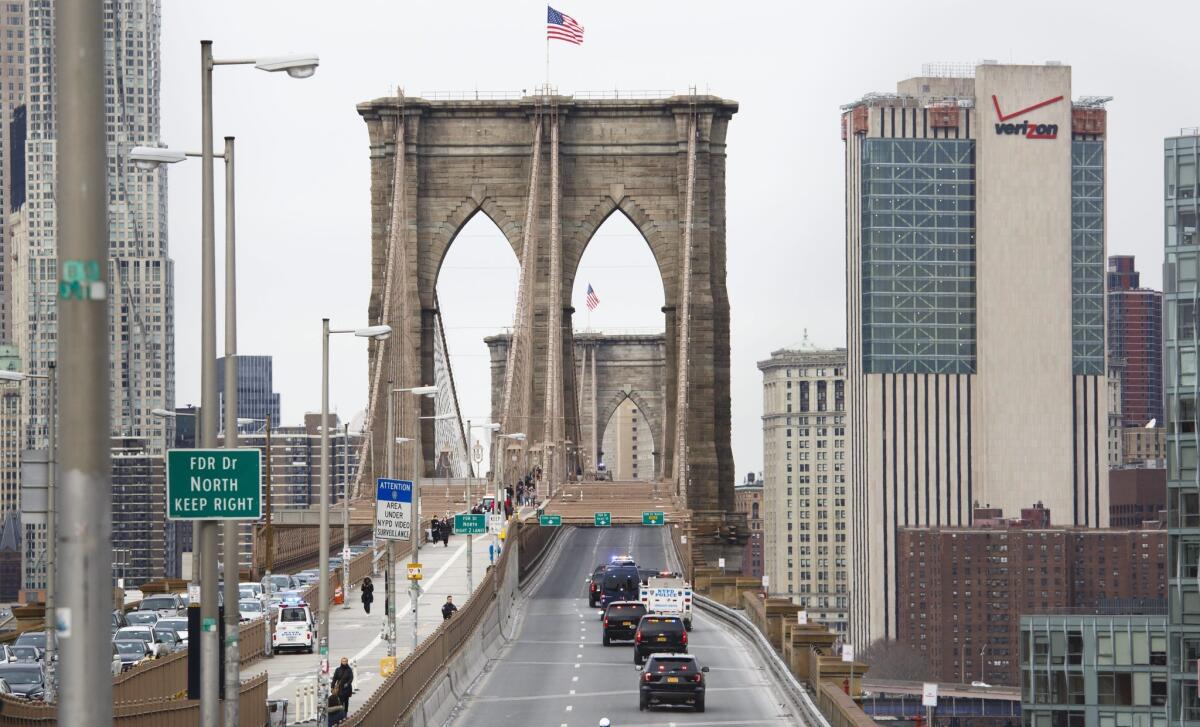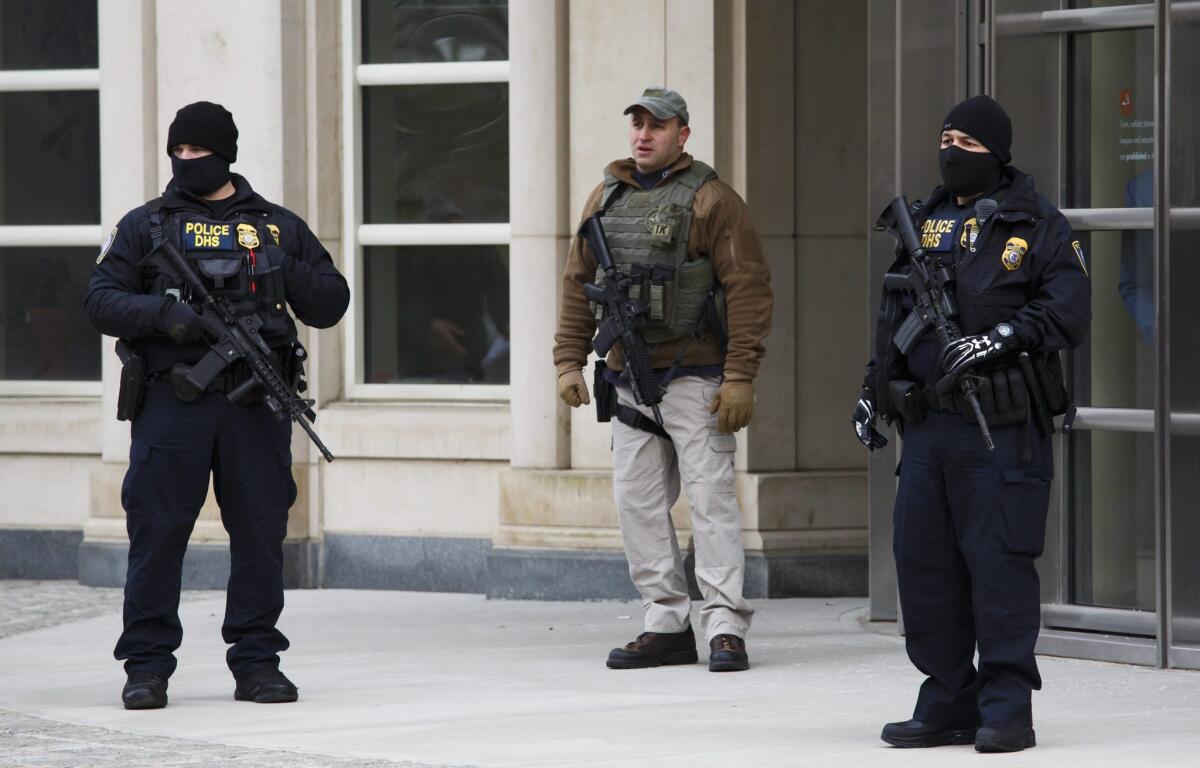Lawyers for ‘El Chapo,’ who twice escaped from Mexican prisons, say N.Y. jail conditions are too strict
Reporting from NEW YORK — Public defenders representing Mexican drug kingpin Joaquin “El Chapo” Guzman presented a litany of challenges to the government’s 17-count indictment on Friday, arguing that he’s being held in overly restrictive conditions and that his extradition from Mexico may have been illegal.
Guzman, wearing a dark navy jumpsuit, stayed silent and still as the attorneys spoke, occasionally conferring with an interpreter.
He has pleaded not guilty to a wide swath of charges, including drug trafficking, conspiracy and murder. He is currently allowed a single hourlong exercise break a day and can only visit with a select team of defense attorneys.
“We aren’t even allowed to give Mr. Guzman a glass of water,” defense attorney Michelle Gelernt told the court. Even Guzman’s wife is unable to visit him — she saw him for the first time since his extradition in court on Friday, Gelernt said.
Judge Brian M. Cogan ruled that the famously elusive Guzman would continue to be kept under tight security at the discretion of law enforcement officials.
“This may put defense counsel under burdens that are somewhat unusual, but the defendant’s public history is somewhat unusual,” Cogan said, making reference to Guzman’s celebrated prison escapes in Mexico in 2001 and 2015.

At the center of the hearing was an argument by Guzman’s defense team challenging the Mexican extradition orders that sent Guzman to the United States in the middle of the night in January on the final evening of the Obama presidency.
The orders, defense attorneys argued, never contained the charges Guzman now faces in New York, which means he could be tried in another jurisdiction, such as Texas or California, or the extradition orders could be found illegal altogether. The attorneys’ argument was based on speculation, because they hadn’t actually seen the orders. On Friday, Cogan ordered that the documents be released to Guzman and his defense team.
“I don’t care whether Mr. Guzman refuses them and they have to be dropped on the floor,” Cogan said, ordering Mexican consulate officials to ensure Guzman and his legal team had access to the paperwork.
But Gelernt later told reporters that Guzman and his lawyers met with Mexican officials after the hearing. She said the officials once again refused to give them the papers without Guzman signing for the documents, which Cogan said Guzman was not required to do.
“I cannot imagine any lawyer in this circumstance would allow Mr. Guzman to sign a document that he was not able to read or that we were not able to review and advise him on,” Gelernt told reporters.
The circumstances of Guzman’s legal representation also came up at the hearing. Prosecutors argued that Guzman had “significant assets” as a former billionaire drug trafficker and shouldn’t have to rely on public defense attorneys in the first place.
Yet defense attorney Michael Schneider told reporters that Guzman was in no position to hire an attorney for himself.
“We think it’s ridiculous that the government expects Mr. Guzman to choose a counsel when he is locked up 23 hours per day. If they want him to hire a lawyer, we believe he needs to be able to speak with his family and confer with them about his wishes for counsel.”
Cogan allowed Guzman to retain his public defense team to “get things moving” in the run-up to trial, but said he would revisit the issue as needed.
Guzman is being held in Manhattan’s Metropolitan Correctional Center, which has been nicknamed “the Guantanamo of New York” for its isolated cells and foreboding atmosphere.
For court appearances, he is shuttled into Brooklyn via a convoy of law enforcement vehicles which often snarls morning traffic. On Friday, his motorcade was accompanied by police helicopters overhead.

In a hearing earlier in the week without Guzman in attendance, Cogan ordered Guzman to appear in person Friday rather than by videoconference, agreeing with defense attorneys that he needed to be present throughout his trial.
But the security precautions haven’t stopped inmates in other facilities, awed by El Chapo’s legendary status, from pledging their loyalty to him and offering their help to set him free. A group of prisoners in a private prison in California even released a video swearing their allegiance to Guzman.
Hansen is a special correspondent.
ALSO
Murder, torture, drugs: Cartel kingpin’s wife says that’s not the ‘El Chapo’ she knows
Video shows California prisoners offering protection and escape help to drug lord ‘El Chapo’
‘El Chapo’ says he’s depressed by prison life, complains of ‘psychological torture’
UPDATES:
12:10 p.m.: This article was updated with comments from Michelle Galernt and background on the case against Joaquin “El Chapo” Guzman.
11 a.m.: This article was updated with more details from the court appearance.
This article was originally published at 8:15 a.m.
More to Read
Sign up for Essential California
The most important California stories and recommendations in your inbox every morning.
You may occasionally receive promotional content from the Los Angeles Times.









